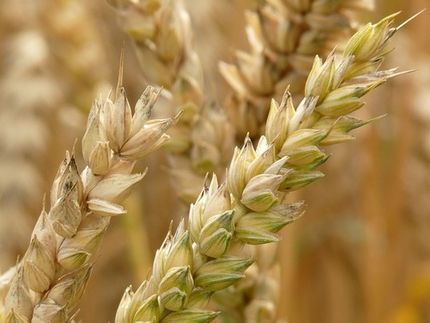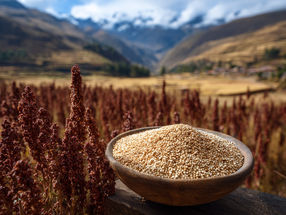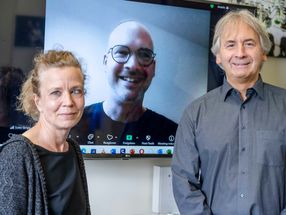Unlocking the genetic secrets of fruit firmness
How a single mutation doubled strawberry firmness
strawberries are notoriously soft and highly perishable, posing challenges to global production. Recent research has identified a genetic breakthrough that could help cultivate firmer strawberries with enhanced shelf-life. The study focuses on a specific gene, POLYGALACTURONASE1 (FaPG1), which influences fruit firmness by regulating cell wall degradation. Loss-of-function mutations in this gene double fruit firmness, making strawberries more resilient to damage during storage and transportation. This discovery could have major implications for breeding strategies aimed at improving fruit quality and longevity.
Strawberry firmness has long been a key trait for breeding, influencing both storage capacity and marketability. While wild-type strawberries are soft and easily bruised, the development of firm-fruited cultivars has been crucial to extending their shelf life. Despite previous research on the gene FaPG1, the genetic mechanisms behind fruit firmness variation remained poorly understood. This study delves into the molecular biology of the gene and identifies key mutations that control fruit texture. Due to these findings, further research is now required to explore the full range of genetic contributors to firmness.
The team from the University of California, Davis, and the United States Department of Agriculture has published new findings on the genetic basis of fruit firmness in strawberries. The research, published in Horticulture Research in November 2024, reveals that mutations in the FaPG1 gene significantly affect the texture of strawberries, leading to firmer fruit. The study provides a valuable insight into how these genetic variations could be applied in breeding programs to produce strawberries with enhanced firmness and longer shelf life.
The research team identified a key mutation in the FaPG1 gene responsible for fruit softening in strawberries. Through genome-wide association studies (GWAS) and gene expression analysis, they found that loss-of-function mutations in FaPG1 led to a doubling of fruit firmness in strawberries. Notably, an En/Spm transposon insertion upstream of FaPG1 appears to reduce gene expression, resulting in firmer fruit. The researchers also developed highly accurate genotyping assays that allow for marker-assisted selection (MAS) of this favorable mutation, which could greatly streamline breeding efforts for firmer, more durable strawberries.
"Understanding the genetic underpinnings of fruit firmness opens up new opportunities for enhancing strawberry cultivation," said Dr. Steven J. Knapp, the study’s lead researcher from the University of California, Davis. "This mutation not only increases firmness but also provides a robust genetic marker that can be used in breeding programs. The potential for improving fruit quality and extending postharvest life is immense, and we are excited to see how these findings will impact the industry."
The identification of genetic variants associated with fruit firmness in strawberries has profound implications for the agricultural sector. By using these findings, breeders can develop new strawberry varieties that maintain quality during transportation and have extended shelf-lives, reducing food waste. The ability to use molecular markers to select for desired traits will accelerate breeding programs, making them more efficient and effective. Additionally, the research provides insights that could be applied to other soft fruits, paving the way for broader agricultural improvements in fruit quality.
Original publication
Nicolás P Jiménez, Marta Bjornson, Randi A Famula, Dominique D A Pincot, Michael A Hardigan, Mary A Madera, Cindy M Lopez Ramirez, Glenn S Cole, Mitchell J Feldmann, Steven J Knapp; "Loss-of-function mutations in the fruit softening gene POLYGALACTURONASE1 doubled fruit firmness in strawberry"; Horticulture Research, Volume 12, 2024-11-19
Most read news
Original publication
Nicolás P Jiménez, Marta Bjornson, Randi A Famula, Dominique D A Pincot, Michael A Hardigan, Mary A Madera, Cindy M Lopez Ramirez, Glenn S Cole, Mitchell J Feldmann, Steven J Knapp; "Loss-of-function mutations in the fruit softening gene POLYGALACTURONASE1 doubled fruit firmness in strawberry"; Horticulture Research, Volume 12, 2024-11-19
Organizations
Other news from the department science

Get the food & beverage industry in your inbox
By submitting this form you agree that LUMITOS AG will send you the newsletter(s) selected above by email. Your data will not be passed on to third parties. Your data will be stored and processed in accordance with our data protection regulations. LUMITOS may contact you by email for the purpose of advertising or market and opinion surveys. You can revoke your consent at any time without giving reasons to LUMITOS AG, Ernst-Augustin-Str. 2, 12489 Berlin, Germany or by e-mail at revoke@lumitos.com with effect for the future. In addition, each email contains a link to unsubscribe from the corresponding newsletter.






























































